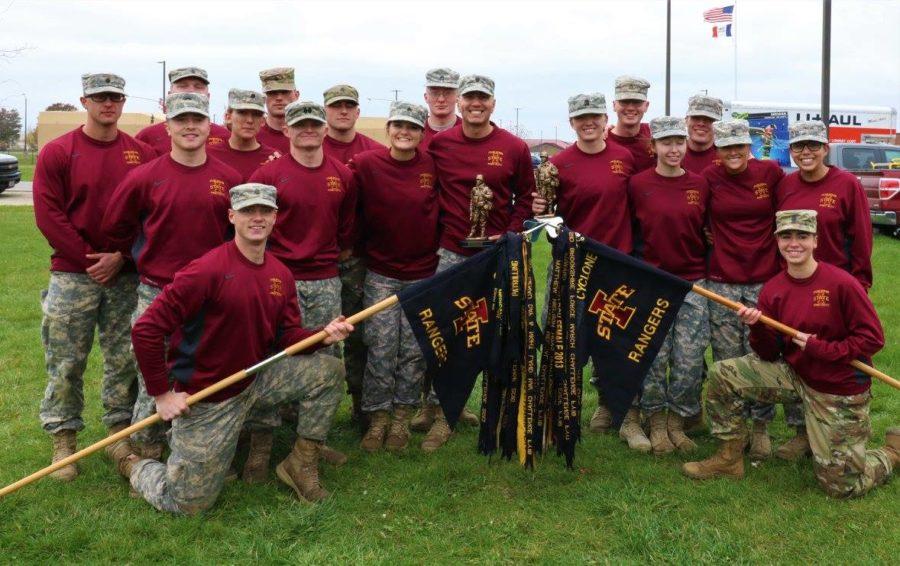Iowa State Army ROTC teams win at Ranger Challenge
Courtesy of Iowa State Army ROTC
Iowa State Army ROTC cadets stand at the Brigade Ranger Challenge.
November 21, 2017
From Nov. 3 to Nov. 5, the Army ROTC at Iowa State participated in the Brigade Ranger Challenge. The challenge is essentially a variety of basic military skills.
There were five five-person teams and five nine-person teams, all from different Midwestern colleges. This year both Iowa State teams, one five-person and one nine-person, brought home the gold. This is the first time in 11 years the cadets have won both this competition and the first round before it.
The Ranger Challenge started with a knowledge exam which tests basic military knowledge in the classroom. The next morning, students participated in “land-navs,” in which they had to find different points using a compass, a map and a protractor.
They then had a series of several other events to participate in. One was medical, in which they had to assess a casualty and medevac them out. Another event was a hand grenade course in which the students took dummy grenades and threw them at targets. They had to extract a crew from a down helicopter and move them to a different location for another event.
The Ranger Challenge consisted of 11 total events, which include the Knowledge Exam, Land Navigation, Medical Lane, Hand Grenade Assault Course and Tactical Lane mentioned above. Other events include the Marksmanship, Commander’s Challenge, Army Physical Fitness Test, One Rope Bridge, Force March and the Obstacle Course.
The Ranger Challenge was tough for some students, but also helped them gain more experience and skills.
“It was a chance to push ourselves and test our limits. We were able to figure out where we can improve, and how we can improve as a team and a program,” said Haley Glowik, junior in civil engineering.
“Moving forward, we have a better sense of confidence that we can do this, and we have a better sense of what we can improve on,” Glowik said.
For the first time in history, Iowa State integrated its teams. The five-person team included four females and one male, and the nine-person team included one female and eight males.
“I really do prefer the integrated teams over the non-integrated teams because it brings a better team energy,” said David Pauls, senior in kinesiology and health.
“It’s a struggle to incorporate both genders into one cohesive team, but we found that if we focus on each other’s strengths we can really blend to a much stronger team overall,” Pauls said.
Along with both teams getting first place, the nine-person team will also be moving on to nationals which take place in West Point, New York, in April.
“I feel pretty on top of the world. It’s a fantastic feeling to have worked so hard – it’s really validating,” Pauls said.
The training for this event is beyond the normal regimen for these students.
“The past two and a half months we’ve been waking up at three in the morning. We’re normal college students, so we’re taking all these credits just like everyone else – but all on three hours of sleep. It’s good knowing that as hard as we were able to push, it’s all because of our training we did in the past,” Pauls said.







